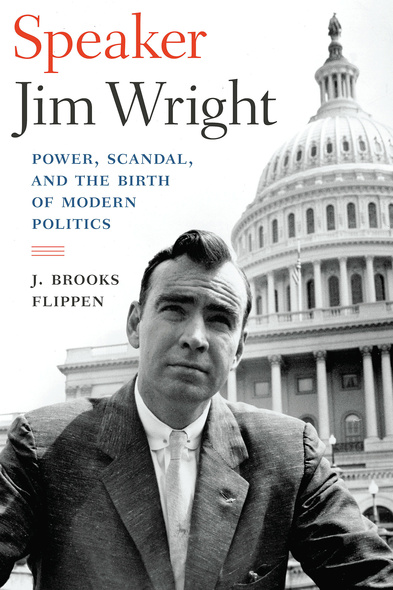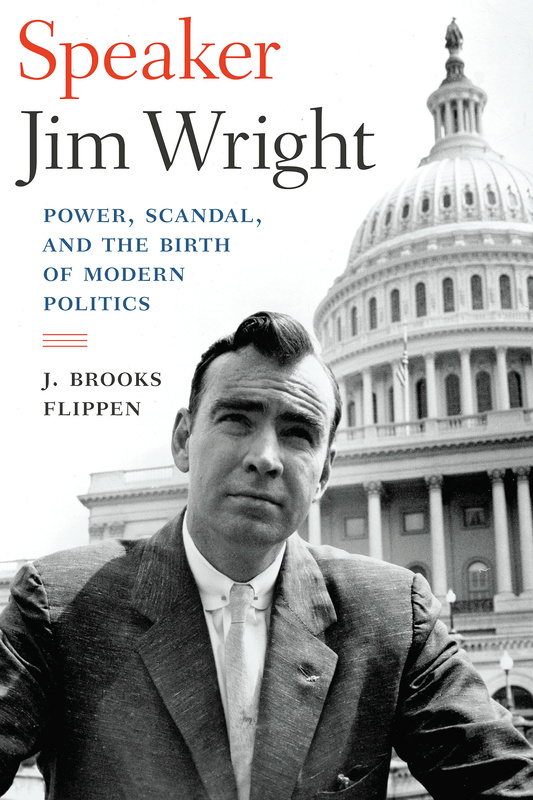Speaker Jim Wright
Power, Scandal, and the Birth of Modern Politics
Honorable Mention, Ramirez Family Award for Most Significant Scholarly Book, Texas Institute of Letters, 2019
Jim Wright made his mark on virtually every major public policy issue in the later twentieth century—energy, education, taxes, transportation, environmental protection, civil rights, criminal justice, and foreign relations, among them. He played a significant role in peace initiatives in Central America and in the Camp David Accords, and he was the first American politician to speak live on Soviet television. A Democrat representing Texas’s twelfth district (Fort Worth), Wright served in the US House of Representatives from the Eisenhower administration to the presidency of George H. W. Bush, including twelve years (1977–1989) as majority leader and speaker. His long congressional ascension and sudden fall in a highly partisan ethics scandal spearheaded by Newt Gingrich mirrored the evolution of Congress as an institution.
Speaker Jim Wright traces the congressman’s long life and career in a highly readable narrative grounded in extensive interviews with Wright and access to his personal diaries. A skilled connector who bridged the conservative and liberal wings of the Democratic party while forging alliances with Republicans to pass legislation, Wright ultimately fell victim to a new era of political infighting, as well as to his own hubris and mistakes. J. Brooks Flippen shows how Wright’s career shaped the political culture of Congress, from its internal rules and power structure to its growing partisanship, even as those new dynamics eventually contributed to his political demise. To understand Jim Wright in all his complexity is to understand the story of modern American politics.
Flippen draws on Wright's memoirs, diaries, and papers; copious library and newspaper archives; and interviews (including conversations with Wright) to offer a definitive, richly detailed biography . . . An engrossing history that sheds light on our own fractious times.
Flippen offers an exhaustive biography that reveals Wright as a Texas go-getter in the mold of mentor President Lyndon B. Johnson. . . The detailed analyses of Wright’s legislative actions will likely make this the authoritative account of his political life.
A vivid and compelling portrait of a grass-roots politician who ascended into the hallowed halls of our nation’s capital and made his mark on practically every major public policy issue in the late 20th century.
Extensively researched and well written…Flippen provides his readers with an excellent political biography, a work that will serve as the authoritative voice on Wright's career for many years to come.'
A very scrupulous 'warts and all' account of the life of Jim Wright and his short-lived and problematic time as Speaker of the House…a good read in addition to representing strong scholarship.
Clearly written and provides a helpful account of Wright's rise in national politics…historians of twentieth-century Texas will want to read this book.
A detailed, thoroughly researched account of a lost political species: the moderate southern Democrat.
[An] engaging treatment of Wright's life and career…Flippen makes a convincing case that Wright deserves a place in the ranks of Texas political giants.
Much-needed…this book offers a definitive political biography of Wright while also illuminating the multifaceted and complex structure of Congress and the individuals who serve in it.
Everyone interested in the power structure of Congress and late twentieth-century public policy issues should fine a place for Speaker Jim Wright on their bookshelf.
Jim Wright’s career charts the rise and fall of Congress as an effective source of domestic and global policy after WWII. From civil rights to Cold War foreign policy, Wright was part of the bipartisan compromises that made Congress a source of pragmatic legislation. Speaker Wright’s demise marked the end of that era and the beginning of our own hyperpartisan logjam. This biography is a deeply researched and relevant history that everyone concerned about our current politics should read.
Jim Wright is a significant figure in the history of American politics, well deserving of the careful attention he receives in Brooks Flippen’s biography. Wright shaped many of the seminal debates of the postwar decades, and through him we come to a better understanding of American political history. In the end, we also come to comprehend more deeply the scandal and corruption culture that has become such a prominent and noxious fixture of modern American politics. Well written and drawn from deep research—including interviews with Wright—this book will remain the biography of Jim Wright for a long time to come.
J. Brooks Flippen is a professor of history at Southeastern Oklahoma State University. His previous books are Jimmy Carter, the Politics of Family, and the Rise of the Religious Right, Conservative Conservationist: Russell E. Train and the Emergence of American Environmentalism, and Nixon and the Environment.
- Introduction. The Long Shadow of Scandal: The Forgotten Legacy
- Part I. The Rise of a Politician
- 1. The Foundations for Success: Family and Childhood (1922–1939)
- 2. The Lessons of Life: College and War (1939–1944)
- 3. Ambition and Frustration: State Legislature (1944–1948)
- 4. Preparation and Payoff: Businessman, Mayor, and Election to Congress (1948–1954)
- Part II. Congress in an Age of Tradition
- 5. Learning the Ropes: The New Congressman (1954–1956)
- 6. Building a Record: The Eisenhower Years (1956–1960)
- 7. Challenges: The Kennedy Years (1960–1963)
- 8. Access to Power: Johnson Takes Control (1963–1965)
- 9. The Rough Path Forward: Years of Change (1965–1968)
- Part III. Leadership in an Age of Dynamism
- 10. Old School: A Moderate in the Nixon Years (1968–1972)
- 11. Bombshell: The Watergate Crisis (1972–1974)
- 12. The Ripples of Watergate: A New Congress and New Opportunity (1972–1976)
- 13. The New Majority Leader: Critical Decisions in an Age of Partisanship (1976–1978)
- 14. The Struggle for Unity: The Carter Years (1978–1980)
- Part IV. Victory and Defeat in the Age of Reagan
- 15. A Challenge Like None Before: Reagan (1980–1982)
- 16. Rallying the Opposition: Friends and Enemies (1982–1986)
- 17. On the Mountaintop: Speaker of the House (1986–1989)
- 18. In the Valley: Resignation and Its Aftermath (1987–2015)
- Epilogue. The Politics of Scandal and the Judgment of History
- Acknowledgments
- Notes
- Index








